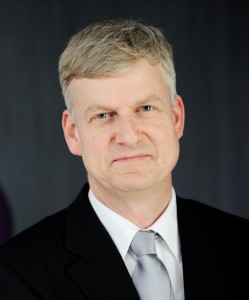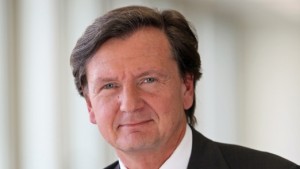Wil van der Aalst: Process Mining – Spreadsheet-Like Technology for Processes
Mittwoch, 09. März 2016, 09.45-10.30 Uhr im Audimax, Humboldtbau
[PDF-Download] des Keynote-Vortrags
Abstract
Process mining provides new ways to utilize the abundance of data in enterprises. Suddenly many organizations realize that survival is not possible without exploiting available data intelligently. A new profession is emerging: the data scientist. Just like computer science emerged as a new discipline from mathematics when computers became abundantly available, we now see the birth of data science as a new discipline driven by the torrents of event data available today. These event data enable new forms of analysis facilitating process improvement. Process mining provides a novel set of tools to discover the real process, to detect deviations from some normative process, and to analyze bottlenecks and waste. Process mining will be an integral part of the data scientist’s toolbox. Process mining is as generic as a spreadsheet. Where spreadsheets work with numbers, process mining starts from event data with the aim to analyze processes. In his talk Wil van der Aalst will show that a wide range of „Wirtschaftsinformatiker/innen“ can benefit from this spreadsheet-like technology tailored towards the analysis of behavior rather than numbers. He will also demonstrate how easy it is to get started and at the same time highlight the many academic challenges of this young research discipline.
Short Bio

Prof.dr.ir. Wil van der Aalst is a full professor of Information Systems at the Technische Universiteit Eindhoven (TU/e). At TU/e he is the scientific director of the Data Science Center Eindhoven (DSC/e). Since 2003 he holds a part-time position at Queensland University of Technology (QUT). His personal research interests include workflow management, process mining, Petri nets, business process management, process modeling, and process analysis. Wil van der Aalst has published more than 180 journal papers, 18 books (as author or editor), 400 refereed conference/workshop publications, and 60 book chapters. Many of his papers are highly cited (he one of the most cited computer scientists in the world and has an H-index of 120 according to Google Scholar) and his ideas have influenced researchers, software developers, and standardization committees working on process support. He has been a co-chair of many conferences including the Business Process Management conference, the International Conference on Cooperative Information Systems, the International conference on the Application and Theory of Petri Nets, and the IEEE International Conference on Services Computing. He is also editor/member of the editorial board of several journals, including Computing, Distributed and Parallel Databases, Software and Systems Modeling, the International Journal of Business Process Integration and Management, the International Journal on Enterprise Modelling and Information Systems Architectures, Computers in Industry, Business & Information Systems Engineering, IEEE Transactions on Services Computing, Lecture Notes in Business Information Processing, and Transactions on Petri Nets and Other Models of Concurrency. In 2012, he received the degree of doctor honoris causa from Hasselt University in Belgium. He served as scientific director of the International Laboratory of Process-Aware Information Systems of the National Research University, Higher School of Economics in Moscow. In 2013, he was appointed as Distinguished University Professor of TU/e and was awarded an honorary guest professorship at Tsinghua University. In 2015, he was appointed as honorary professor at the National Research University, Higher School of Economics in Moscow. He is also a member of the Royal Netherlands Academy of Arts and Sciences (Koninklijke Nederlandse Akademie van Wetenschappen), Royal Holland Society of Sciences and Humanities (Koninklijke Hollandsche Maatschappij der Wetenschappen) and the Academy of Europe (Academia Europaea).
Michael Byczkowski: Benutzer-zentriertes Design in Unternehmen – vom Exoten zum echten Wettbewerbsvorteil
Mittwoch, 09. März 2016, 12.30-13.15 Uhr im Audimax, Humboldtbau
[PDF-Download] des Keynote-Vortrags
Abstract
2015 haben mehr und mehr Unternehmen externe Design-Agenturen gekauft, um sich von ihrer Konkurrenz abzuheben. Warum ist Design plötzlich so wichtig? – Kann Design nicht nur einen visuellen, sondern auch einen monetären Mehrwert für Unternehmen schaffen? In diesem Vortrag erfahren Sie, wie Unternehmen aller Größen SAPs benutzer-zentrierten Design-Ansatz nutzen, um die digitale Transformation bei sich voranzutreiben, neue Geschäftsfelder zu erschließen, sowie die gesamte Unternehmenskultur verbessern und sich so einen Wettbewerbsvorteil verschaffen.
Short Bio
 Michael Byczkowski is Vice President, Head of Customer Design Engagement at SAP.
Michael Byczkowski is Vice President, Head of Customer Design Engagement at SAP.
Michael’s key motivation is to help deliver world-class user experience design services for our customers and partners.
With more than twenty years of experience in IT and consulting, Michael has a broad background in business development, strategic alliances management, and developer/platform strategy.
After finishing his diploma in Mathematics, Michael started his professional career at a German utility company, focusing on Business Process Reengineering and Privacy/Data Security. Sixteen years ago, he joined SAP’s Industry Business Unit for the utilities industry, working abroad in Singapore for three years where he was leading the regional product management for Asia-Pacific and Japan.
Following this assignment, Michael headed the Microsoft global alliance team at SAP for nine years and established the joint SAP-Microsoft Collaboration Technology Support Center before leading the Gateway strategy, a technology that provides a simple way to connect devices, environments and platforms to SAP software based on market standards, of SAP’s global ecosystem organization.
Michael lives in Walldorf, Germany, with his wife and two daughters.
Winfried Holz: Digitale Souveränität – Die Überlebensstrategie für den IT-Standort Europa
Donnerstag, 10. März 2016, 12.30-13.15 Uhr im Audimax, Humboldtbau
[PDF-Download] des Keynote-Vortrags
Abstract
Digitalisierung ohne Schutz und Vertrauen kann nicht funktionieren. Die digitale Souveränität ist der Schlüssel zu einem starken IT-Standort in Europa und der erfolgreichen digitalen Transformation der Wirtschaft.
Europa ringt mit seiner Rolle in der Digitalisierung. Die Stimmen werden lauter, die die digitale Entwicklung als Gefahr für unsere Freiheit und Demokratie wahrnehmen. Wenn wir uns in der digitalen Welt bewegen, hinterlassen wir Spuren mit persönlichen Informationen – über unsere Freunde, unsere Vorlieben und unser Verhalten. Dem Nutzer ist nur in Ansätzen bewusst, wofür diese Daten heute oder in Zukunft benutzt werden. Vielleicht wird unser Facebook-Freundeskreis künftig unsere Kreditwürdigkeit beeinflussen und die Höhe unserer Krankenkassenbeiträge. Und was passiert mit Leuten, die gar nicht bei Facebook sind?
Anhand unserer Profile, die wir freiwillig oder unfreiwillig in der digitalen Welt erzeugen, werden uns personalisierte Informationen in Form von Werbung oder Nachrichten zur Verfügung gestellt – in den meisten Fällen sogar kostenlos! Der Algorithmus gibt uns das was wir, laut unseres Profils, zu wollen scheinen. Damit verlieren wir jedoch die Informations- und Deutungshoheit. Die Digitalisierung der Welt macht also bisher Privates öffentlich und beeinflusst damit unser Wohlergehen. Gleichzeitig wird unser Blick gelenkt und wir haben nur noch auf zensierte Informationen Zugriff. Die Gefahr der Freiheitsbeschränkung des Einzelnen für sich und als mündiger Staatsbürger ist also real.
Welche Konsequenzen müssen wir daraus ziehen? Das liegt auf der Hand: Um künftig unsere Freiheit zu erhalten und das Vertrauen in die Digitalisierung wieder herzustellen, müssen wir unsere digitale Souveränität wiedergewinnen.
Digitale Souveränität bedeutet, die Fähigkeit zur ausschließlichen Selbstbestimmung. Selbstbestimmte Bürger, Staaten und Unternehmen sind handlungs- und entscheidungsfähig. Sie lassen nicht unkritisch andere über ihre Angelegenheiten entscheiden, aber sie müssen auch nicht alles selbst tun. Diese Souveränität ist die Voraussetzung für Vertrauen in die Digitalisierung und damit die Grundlage für die erfolgreiche Transformation der Wirtschaft.
Kurzbio

Winfried Holz (Jg. 58) ist Mitglied des Präsidiums des BITKOM (Bundesverband Informationswirtschaft,
Telekommunikation und neue Medien e.V.) und seit Juli 2011 Chief Executive Officer (CEO) von Atos Deutschland. Damit verantwortet er das Deutschland-Geschäft des internationalen IT-Dienstleistungsunternehmens, das aus dem Zusammenschluss von Atos Origin und der Siemens IT Solutions and Services GmbH hervorgegangen ist.
Der studierte Wirtschaftsingenieur Winfried Holz begann seine Karriere 1984 als System Engineer und darauf folgend als Sales Manager bei der Siemens AG in Berlin. Hiernach übernahm er bei dem Unternehmen eine Reihe von Führungspositionen, unter anderem als Vice President von Siemens Nixdorf Informationssysteme, als CEO von Siemens Health Services und als President International Operations von Siemens Medical Solutions. 1998 erwarb Winfried Holz den Master of Science in Management im Sloan Fellow Program der MIT Sloan School of Management. Von 2001 bis 2006 verantwortete er das weltweite IT-Lösungsgeschäft von Siemens Business Services. Im Mai 2006 wurde Winfried Holz Geschäftsführer der Fujitsu Services GmbH. Nach dem Erwerb der Aktienmehrheit an dem IT-Dienstleister TDS AG durch Fujitsu Services übernahm er neben seinen bisherigen Aufgaben im November 2007 zusätzlich den Vorstandsvorsitz bei TDS.
Von November 2008 bis Juli 2011 verantwortete Winfried Holz das Geschäft von Atos Origin in der Region Deutschland und CEMA (Österreich, Schweiz, Polen, Türkei, Griechenland und Südafrika).
